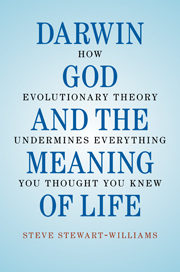 Darwin, God and the Meaning of Life
Darwin, God and the Meaning of Life Book contents
- Frontmatter
- Contents
- Acknowledgments
- 1 Darwin and the big questions
- Part I Darwin gets religion
- 2 Clash of the Titans
- 3 Design after Darwin
- 4 Darwin's God
- 5 God as gap filler
- 6 Darwin and the problem of evil
- 7 Wrapping up religion
- Part II Life after Darwin
- Part III Morality stripped of superstition
- Suggestions for further reading
- References
- Index
6 - Darwin and the problem of evil
Published online by Cambridge University Press: 05 June 2012
- Frontmatter
- Contents
- Acknowledgments
- 1 Darwin and the big questions
- Part I Darwin gets religion
- 2 Clash of the Titans
- 3 Design after Darwin
- 4 Darwin's God
- 5 God as gap filler
- 6 Darwin and the problem of evil
- 7 Wrapping up religion
- Part II Life after Darwin
- Part III Morality stripped of superstition
- Suggestions for further reading
- References
- Index
Summary
Whatever the God implied by evolutionary theory and the data of natural selection may be like, he is not the Protestant God of waste not, want not. He is also not the loving God who cares about his productions … The God of the Galapagos is careless, wasteful, indifferent, almost diabolical. He is certainly not the sort of God to whom anyone would be inclined to pray.
David Hull (1991), p. 486If a tenth part of the pains which have been expended in finding benevolent adaptations in all nature, had been employed in collecting evidence to blacken the character of the Creator, what scope for comment would not have been found in the entire existence of the lower animals, divided, with scarcely an exception, into devourers and devoured, and a prey to a thousand ills from which they are denied the faculties necessary for protecting themselves!
John Stuart Mill (1874), p. 58In the part of this universe that we know there is great injustice, and often the good suffer, and often the wicked prosper, and one hardly knows which of those is the more annoying.
Bertrand Russell (1957), p. 13What's the problem?
Our main conclusion so far is that evolutionary theory dissolves some of the most potent reasons for believing in God. Before going any further, it's worth noting that, even if that's all it did, this would not be a trivial implication. After all, without a reason to believe something, belief is unreasonable.
- Type
- Chapter
- Information
- Darwin, God and the Meaning of LifeHow Evolutionary Theory Undermines Everything You Thought You Knew, pp. 103 - 127Publisher: Cambridge University PressPrint publication year: 2010


